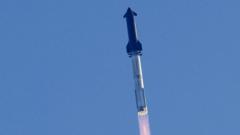Elon Musk's ambitious Starship project encountered failure after its recent Texas launch, yet the successful return of the Super Heavy booster underscores ongoing advancements as the company analyzes the mishap.
SpaceX Starship Test: Loss and Learnings from Latest Launch

SpaceX Starship Test: Loss and Learnings from Latest Launch
After a troubled test launch, SpaceX's Starship faces setbacks but gains new insights for future missions.
A recent test flight of SpaceX's Starship has ended in failure, shortly after its launch from Texas on Thursday, as the upper stage of the spacecraft was lost due to technical issues. However, the company celebrated a small victory with the successful return of the Super Heavy booster, which landed safely back on the launch pad, prompting cheers from the SpaceX ground control team.
The high-profile launch occurred shortly after the debut of Blue Origin's new Glenn rocket system, led by Amazon founder Jeff Bezos, as both entrepreneurs vie for supremacy in the burgeoning space vehicle industry. Following the incident, SpaceX reported that "Starship experienced a rapid unscheduled disassembly during its ascent burn," and promised that teams would comb through flight data to identify potential improvements.
Despite the disappointment, Musk took to X to assure followers that the insights gained from the flight would enhance the reliability of future Starship missions. He stated, "With a test like this, success comes from what we learn," emphasizing that the mission data would shape the development of subsequent Starship iterations.
Unverified social media clips depicted the rocket's fiery disintegration while an alarming display of light across the sky was witnessed in Port-Au-Prince, Haiti, leaving trails of smoke. Musk embodied the unpredictable nature of space exploration by tweeting, "Success is uncertain, but entertainment is guaranteed!" following the launch.
Details shared by Musk suggested an oxygen and fuel leak may have led to the rocket's demise, though he noted no indicators of postponing the next launch, expected next month. The Starship system took off at 17:38 EST (22:38 GMT) in what was the company's seventh test mission. Initially, all aspects were proceeding smoothly, with the upper stage detaching from the booster approximately four minutes into the flight, until contact was lost shortly thereafter.
The Federal Aviation Administration (FAA) confirmed it was monitoring the situation during the launch, implementing temporary airspace restrictions for safety. This incident follows a successful launch the previous day, where SpaceX's Falcon 9 rocket deployed two lunar landers and a micro rover towards the Moon—showcasing the simultaneous advancements in the efforts spearheaded by both Musk and Bezos in the competitive field of space exploration.

















